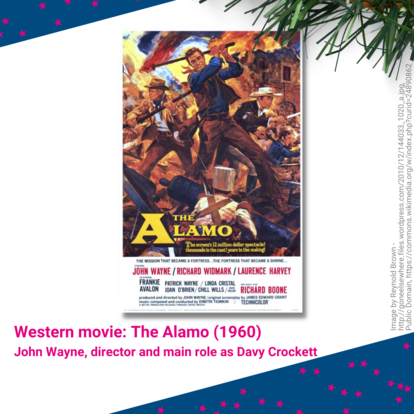Countdown to Christmas
23 - Heroism

- “The man who asks of freedom anything other than itself is born to be a slave”, Alexis des Tocqueville wrote in 1856. Indeed, the ideal of freedom can only be achieved or survive in a society, it is supported by people, who do not see it as a plaything for other - sometimes opportunist – motives, but truly believe in it. At the end our freedom always depends on the courageous.
- To end an authoritarian or totalitarian regime hostile freedom requires more than internal emigration or a waiting for the effects of some general social forces (e.g. an economic decline of the regime). Only the commitment of those who openly resist gets things rolling.
- The attempt by free societies to appease aggressive totalitarian regimes (such as Hitler's Germany then or Putin's Russia today) in order to gain a deceptive peace, often loses both peace and freedom.
- The classical quote: “Give me liberty, or give me death!” (Patrick Henry, 1775)

The film is the first that John Wayne directed himself in order to make his lifelong dream come true. The plot has a real historical background. In 1836, settlers (mostly former US-Americans) in northern Mexico dared to revolt against the country's ruling dictator Santa Anna. The dictator mobilises a huge army against the rebels, who have almost no time to organise themselves militarily.
A small force, including former US Congressman Davy Crockett, barricades themselves in the old Alamo mission station to stop Santa Anna's army. They know that they have no chance and that the dictator takes no prisoners. Nevertheless, they remain voluntarily to fight for freedom. The rebels withstand the attacks for almost two weeks, then the Mexicans succeed to storm the Alamo. All the besieged die heroically for their freedom. But they bought time for the main rebel army. The dictator, one suspects, will lose in the end.
The story of the siege of the Alamo is one of the great historical myths of America. The north of Mexico after this war became the independent Republic of Texas (which joined the US after another war in 1848). John Wayne used the story as an opportunity to present his political credo. In the central passage, Davy Crockett explains his ideal of a republic as a guarantor of freedom. And of course, it is John Wayne himself whose convictions can be heard here: “Republic. I like the sound of the word. It means people can live free, talk free, go or come, buy or sell, be drunk or sober, however they choose. Some words give you a feeling. Republic is one of those words that makes me tight in the throat – the same tightness a man gets when his baby takes his first step or his first baby shaves and makes his first sound as a man. Some words can give you a feeling that makes your heart warm. Republic is one of those words.”
It is true, as critics then in 1960 observed, that there are many historical flaws in the script (Texas, for instance, became a Southern slave state, whereas in Mexico slavery was abolished – in reality there were obviously limits to the Texans' desire for freedom), but the movie does not pretend to be a documentary. It is about an ideal that stands above historical accuracy, namely that freedom is a good that must be defended to the last consequence. And this is, what it does in a most impressive way.
Or as John Wayne has put it, when he said about the movie: “I hope that seeing the Battle of the Alamo will remind Americans that liberty and freedom don’t come cheap.”
